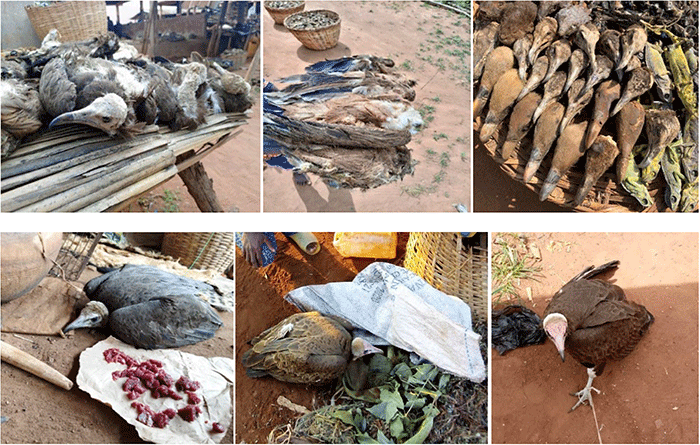Benin's Fetish Markets Driving Vulture Decline
A shocking new study reveals the staggering scale and hidden networks behind belief-based vulture trade.
Vultures sacrificed for supernatural gain
A four-month investigation into nine fetish markets in southern Benin has uncovered the sale of at least 522 Hooded Vultures, a Critically Endangered species, sacrificed and sold primarily for traditional belief-based practices. These vultures - often displayed as dried carcasses, decapitated heads, or even kept alive - are used in vodun rituals believed to offer protection from witchcraft, improve business prospects, or cure illnesses. Despite national and international laws banning their trade, vultures were openly offered for sale, with prices far exceeding the average monthly wage in Benin.
Of those recorded, 73% were entire dried carcasses, 17% were heads, and 9% were live birds. Vendors reported that these birds were not sourced locally - where vultures are now largely extinct - but came from across West Africa, including Ghana, Nigeria, Burkina Faso, and Niger. The demand for vulture parts appears both entrenched and expanding, posing a serious threat to a species already decimated across its range.

Young, male, and aware - the traders behind the trade
Interviews with 115 vendors revealed that the majority were young men from the Fon ethnic group and practitioners of Vodou. Most had no formal education, and although 92% acknowledged being aware of conservation laws, this awareness had little impact on behaviour. Nearly 60% of traders identified as both sellers and traditional healers or fetish priests, using or prescribing vulture parts in various rituals - such as burning powdered heads into soap, or displaying parts to repel evil spirits.
This demographic insight is vital for conservationists aiming to target education campaigns. Vendors clearly understood the value of their trade: some vulture heads sold for over $30, while live birds fetched up to $833 - more than seven times the average monthly income in Benin. Seasonal fluctuations in price, regional origin, and even the buyer’s perceived wealth were also found to influence pricing strategies.
A regional crisis of enforcement and culture
The study makes clear that Benin’s legal framework - which imposes fines and prison sentences for vulture trade - is largely ineffective. No prosecutions are known to have occurred. Meanwhile, belief-based wildlife use is embedded in state-supported cultural traditions. Vodun has been recognised as a national religion since 1996, and fetish markets form part of a thriving cultural economy. The result is a growing, largely unregulated trade with transnational conservation consequences.
Beyond Benin, similar belief-based trades occur across West Africa. Reports from Burkina Faso, Ghana, Guinea-Bissau and Nigeria suggest vultures are deliberately poisoned or trapped to meet cross-border demand. Of particular concern is the high number of vulture heads harvested from poisoned birds, likely to minimise bulk and reduce detection during transport. The persistence of these practices reveals a deadly mix of cultural entrenchment, economic incentive, and weak enforcement capacity.
Conservation at a crossroads
This study is one of the clearest to date in demonstrating how belief-based trade can impact endangered bird populations at a regional scale. Its findings reinforce calls for urgent action: community outreach, improved enforcement, and targeted education campaigns focusing on the cultural and economic drivers behind the trade. Critically, future efforts must address the demand side of the equation - not just the supply chain. That includes engaging with traditional leaders and finding ways to reframe conservation within local belief systems.
The authors note that despite the protected status of Hooded Vultures under national and international law, profits from trade continue to outpace the penalties - fuelling a cycle of overexploitation. They argue for transboundary collaboration under mechanisms such as the CMS Raptors MoU, and call for expanded efforts to track and prosecute illegal wildlife trafficking. Without such interventions, Hooded Vultures could soon disappear entirely from parts of their historical range.
June 2025
Share this story







